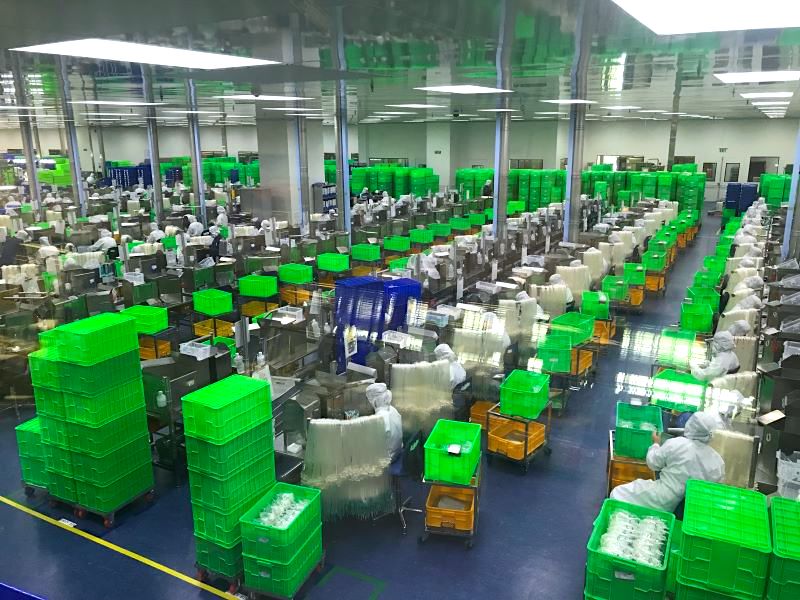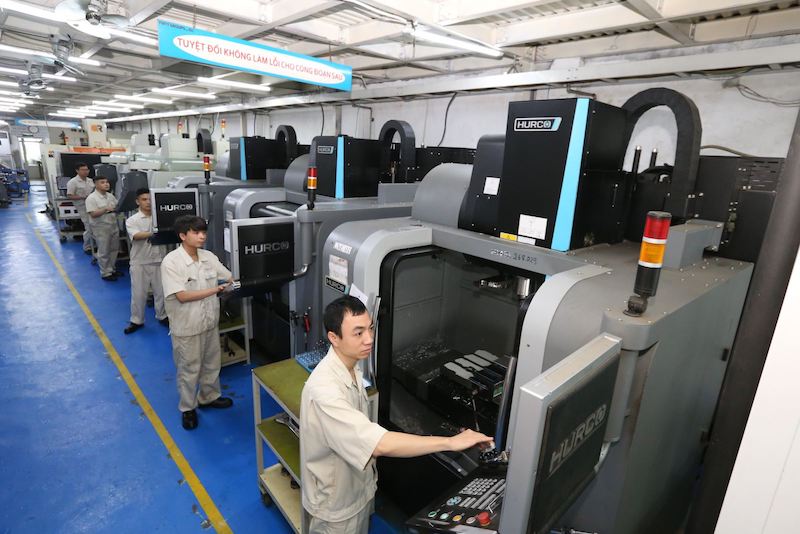Hanoi's enterprises resume operations adapting to new normal
The city is still actively taking measures to remove difficulties for production and business activities.
A number of Hanoi-based enterprises have made efforts to resume production and fulfill contracts and orders, some have even returned to operating at 100% capacity in the context of the new normal.
| Workers at B.Braun Vietnam's factory in Thanh Oai District's industrial cluster. HNT Photo: Binh Minh |
Work hard to fulfill orders
These days, many enterprises located in low-Covid-19-risk areas or “green zone” have urgently restored production activities.
In Son Tay town, about 500 workers for Son Ha Garment JSC have returned to work since late August. On the basis of the company’s disease prevention plan, the company is seeking authorization for the reinstatement of 1,000 laborers, accounting for 50% of its total workforce, so that it could fulfill orders signed with its partners until the end of this year.
“From now until the end of the year, it is the peak time of the textile and garment industry and we have to complete these orders,” Pham Huy Ve, Chairman of the Board of Directors of Son Ha Garment JSC, told The Hanoi Times.
In Thanh Oai District’s industrial cluster, from September 6, B.Braun Vietnam, manufacturing medical equipment, has resumed operation at 100% capacity. This was possible when all 1,500 workers of the company received the first jabs and take the PCR test every three days as well as follow the “one route, two locations” plan, in which the company arranges one commuting route between the accommodation and the workplace.
Nguyen Viet Hung, Finance Director of B.Braun Vietnam said, with such a large number of employees, the Covid-19 pandemic prevention work has been activated at the highest level.
As an enterprise in the field of precision mechanics and technology transfer, in recent days, PMTT JSC at Chuong My District’s Phu Nghia Industrial Park has applied measures to ensure both disease prevention and normalization of production and business activities.
Dinh Hong Luong, PMTT’s Director said the company is completely aware of the impact of Covid-19 on production, so it regularly reviews the supply of input materials to promptly update prices and delivery plans as well. They have also improved business management and cut unnecessary costs in production.
“In the context of complicated developments of Covid-19, we have both strictly enforced disease prevention regulations and tried to maintain revenue,” Luong told The Hanoi Times.
| Workers at PMTT's factory before the pandemic. Photo: PMTT JSC |
Located in the high-Covid-19-risk area or “red zone” in Hoang Mai District, ABB Power Grids Vietnam, which employs more than 700 people, has operated at 70% capacity in line with the city's social distancing regulations.
General Director of ABB Power Grids Vietnam Chandan Singh said the company has applied the “business green zone” model in which all employees are tested for coronavirus weekly, 95% of employees received the first dose of vaccine and 5% got the second jab.
“The company ensures paycheck for all the employees including those who have worked from home,” he told The Hanoi Times.
Assessing the initiative to restore production of “green zone” enterprises, Deputy Director of the Hanoi Department of Industry and Trade Dam Tien Thang said enterprises in Hanoi have actively built safe production plans with the determination to maintain industrial growth at the highest level.
Supportive measures
However, a number of businesses have faced difficulties that have prevented them from ensuring the paycheck of their employees as well as maintaining their operations. They cannot sell products due to congestion in the movement of goods, lack of raw materials, and the surges in the price of input materials in addition to not being able to access bank capital.
The latest report conducted by the Hanoi Department of Planning and Investment showed that, in the first eight months of 2021, the number of enterprises temporarily suspending operation rose by 19% year-on-year during the period, while other 2,200 completed the dissolution process or an increase of 36%.
Tran Anh Tuan, Deputy Head of the Hanoi Industrial and Export Processing Zones Management Board said even though enterprises in industrial clusters are allowed to operate under the “three on-site” (three-on-the-spot) or “one route two locations” plan, this is seen as a temporary solution, not a long term one.
Thang stated, in the context of complicated developments of the Covid-19, the city has actively taken actions to remove difficulties for production and business activities, ensure social security as well as support financial packages for local companies.
The Hanoi Department of Industry and Trade efforts in matching businesses and banks have helped businesses promptly access many preferential credit programs. The tax sector has also guided taxpayers in filing requests for debt extension and tax arrears cancellation.













